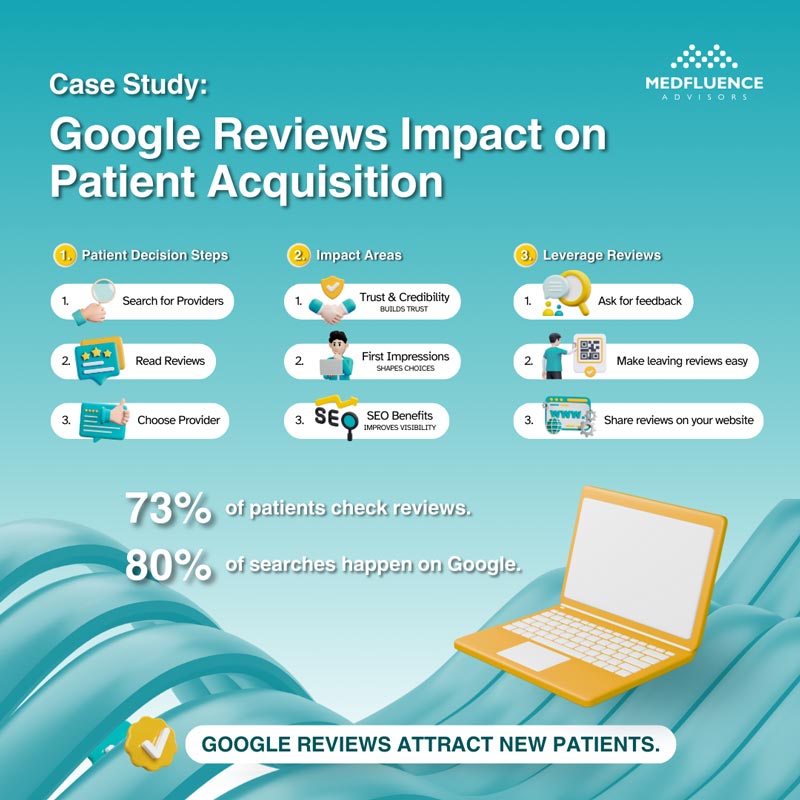How Google Reviews Drive Patient Acquisition for Healthcare Practices

In today’s digital landscape, online reviews are pivotal to business success across all industries. For healthcare practices, Google reviews are not only a reflection of patient satisfaction but a key influence on potential patients’ decision-making. From forming initial impressions to building trust and loyalty, Google reviews shape the online reputation of healthcare practices and play a critical role in patient acquisition.
The Role of Google in Patient Decisions and Healthcare Choices
As the world’s leading search engine, Google processes over 8.5 billion searches daily, with 80% of global internet searches occurring on this platform. When people search for a service or business, including medical providers, Google often provides both the location and detailed reviews from previous patients. These reviews become the lens through which potential patients gauge the quality of a practice before deciding whether to book an appointment.
When people search for a new restaurant or hotel, they rely heavily on Google reviews to make an informed choice. The same principle applies to healthcare; patients trust the feedback from others who have been treated at a specific clinic or by a specific provider. In fact, surveys reveal that 73% of patients consider online reviews an essential factor when choosing a healthcare provider. For private practices, building and maintaining a positive online presence on Google is crucial to staying competitive.
How Positive Reviews Drive Patient Acquisition
For healthcare practices, Google reviews are an invaluable source of social proof. Patients are more likely to choose a clinic with a strong reputation, and online reviews offer an immediate and accessible way for potential patients to learn about others’ experiences.
Positive reviews benefit practices in several ways:
- Improved First Impressions: The first page of a Google search result often displays a practice’s reviews, giving potential patients an immediate sense of quality and reliability. Practices with high ratings and recent positive feedback stand out, helping them capture new leads.
- Increased Trust and Credibility: Patients seek assurance about the quality of care they will receive. Positive reviews, especially those that mention specific staff members or treatments, can increase a patient’s confidence in a practice’s expertise and customer care.
- Higher Search Engine Rankings: Google’s algorithms favor businesses with frequent and positive reviews, boosting their visibility on the search engine results page (SERP). A practice with good SEO rankings and positive reviews has a greater chance of being seen by prospective patients searching for healthcare services in their area.
Leveraging Google Reviews as a Competitive Advantage
For healthcare providers, managing Google reviews isn’t just about reputation management; it’s also about gaining a competitive edge in a crowded market. Below are some strategies practices can use to actively manage and capitalize on Google reviews.
1. Encourage Patients to Leave Reviews
A proactive approach to gathering reviews is essential. Medical practices can encourage patients to leave feedback by:
- Providing In-Office Reminders: QR codes at the reception desk can link directly to the review page. Receptionists can remind patients to leave feedback, which can improve the volume of positive reviews.
- Automated Follow-Ups: After an appointment, a simple text message or email with a link to the review page can serve as a gentle reminder for patients to share their experience.
2. Respond to Reviews Promptly
When patients see that a practice values their feedback by responding to reviews, it creates a positive impression. Healthcare providers should:
- Acknowledge Positive Feedback: Thanking patients for their reviews shows appreciation, which can foster loyalty and encourage repeat visits.
- Address Negative Reviews Constructively: Negative reviews should be handled with care. Practices should apologize for any inconvenience, clarify misunderstandings, and invite the reviewer to discuss their concerns privately. A respectful response demonstrates professionalism and a commitment to quality care.
3. Showcase Reviews on Websites and Social Media
Highlighting positive feedback on the practice’s website or social media channels can increase reach beyond Google. This strategy:
- Boosts Social Proof: Featuring real patient testimonials creates transparency and builds trust with new patients.
- Enhances Brand Image: Showcasing feedback that highlights exceptional care and patient satisfaction strengthens the practice’s brand and positions it as a trusted provider.

Case Study Examples of Google Reviews Impacting Patient Choices
Example 1: A Positive Reputation Builds Community Trust
Consider a dermatology clinic that has actively encouraged patients to leave reviews over the past year. The clinic has accumulated over 200 reviews with an average rating of 4.8 stars. Many reviews highlight the friendly staff, minimal wait times, and the effectiveness of treatments. Because of this stellar reputation, the clinic has seen a 25% increase in patient inquiries and a 15% boost in new patient bookings.
This example shows that a well-maintained review profile can build trust in a community and attract new patients.
Example 2: Managing Negative Reviews to Build Credibility
Another case involved a dental clinic that received a handful of negative reviews due to long wait times. Instead of ignoring these comments, the clinic publicly acknowledged the concerns, explained the steps taken to improve wait times, and invited dissatisfied patients to contact them directly. This proactive approach helped the clinic regain credibility, as potential patients saw the commitment to patient care. Following these responses, the clinic began receiving positive feedback about their improved processes.
This scenario demonstrates how addressing issues in reviews can enhance a practice’s reputation and lead to patient loyalty.
Long-Term Benefits of Google Reviews in Patient Retention and Loyalty
Beyond patient acquisition, Google reviews are instrumental in patient retention. Satisfied patients who share their experiences online contribute to a cycle of trust and loyalty that reinforces a practice’s reputation. Patients who feel their voice is heard and valued are more likely to return for future care and recommend the practice to others.
1. Creating a Feedback Loop for Continuous Improvement
Practices can use reviews as a feedback loop to identify areas needing improvement. If multiple reviews mention the same issue—such as long wait times or limited parking—the practice can address these concerns, leading to a better overall patient experience and potentially turning negative feedback into positive reviews over time.
2. Building Loyalty Through Transparency
Patients value transparency, and Google reviews offer an unfiltered look at a practice’s strengths and weaknesses. By embracing both positive and constructive feedback, practices can show patients they are committed to improvement, fostering loyalty among existing patients and building a positive reputation for prospective ones.
Boosting Patient Acquisition with Review-Based Marketing Campaigns
Google reviews can also be leveraged in marketing campaigns to attract new patients:
- Highlight Patient Testimonials: Sharing patient stories that highlight successful treatments or compassionate care can resonate with potential patients. Incorporating these testimonials in newsletters, social media, or ads can attract new patients looking for similar experiences.
- Use High-Rated Reviews in SEO Campaigns: Incorporating keywords from positive reviews into website content can help improve SEO. For example, if reviews frequently mention “pediatric care” or “allergy treatments,” these keywords can be added to the website to improve its ranking for related searches.
Why Google Reviews Are Essential for Patient Acquisition and Retention
In the modern healthcare landscape, where patients have more choices than ever, Google reviews play a crucial role in shaping a practice’s reputation. Positive reviews not only enhance a practice’s visibility but also serve as a testament to the quality of care provided. By actively managing Google reviews, healthcare practices can foster a positive online reputation that attracts and retains patients in a highly competitive field.
For practices looking to grow and succeed, the strategy is clear: embrace Google reviews, respond thoughtfully, and use feedback to improve patient care. With a well-rounded approach to managing reviews, healthcare providers can turn satisfied patients into brand advocates who drive long-term success and community trust.


